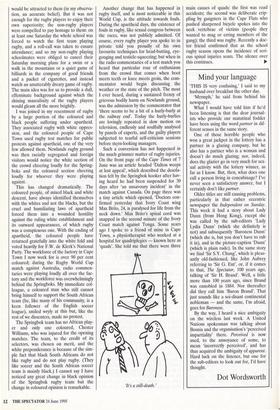Mind your language
"THIS IS very confusing,' I said to my husband over breakfast the other day.
`Mrrmph,' he said from behind his newspaper.
What I would have told him if he'd been listening is that the dear journal- ists who provide our matutinal fodder have been using the word partner in dif- ferent senses in the same story.
One of those horrible people who won a great jackpot in the lottery has a partner in a glazing company, but he also has a partner who is a woman and doesn't do much glazing; nor, indeed, does the glazier go in very much for sex- ual activity with the lottery winner, as far as I know. But, then, what does one call a person living in concubinage? I've never seen a satisfactory answer, but I certainly don't like partner.
Older titles are still causing problems, particularly in that rather eccentric newspaper the Independent on Sunday. This week it had a story about Lady Dunn (from Hong Kong), except she was called by the sub-editors 'Lady Lydia Dunn' (which she definitely is not) and subsequently 'Baroness Dunn' (which she is, but you don't have to rub it in), and in the picture-caption 'Dunn' (which is plain rude). In the same story we find 'Sir S.Y. Chung', which is pleas- antly old-fashioned, like John Aubrey referring to 'Sir G. Ent', or, if it comes to that, The Spectator, 100 years ago, talking of 'Sir H. Brand'. Well, a little more than 100 years ago, since Brand was ennobled in 1884. Nor thereafter did they call him 'Baron Brand'. That just sounds like a soi-disant continental nobleman — and the same, I'm afraid, goes for Baroness.
By the way, I heard a nice ambiguity on the wireless last week. A United Nations spokesman was talking about Bosnia and the organisation's 'perceived impartiality' there. Perceived is now used, to the annoyance of some, to mean 'incorrectly perceived', and has thus acquired the ambiguity of apparent. Hard luck on the listener, but one for the sub-editors to look out for, I'd have thought.
Dot Wordsworth


























































 Previous page
Previous page